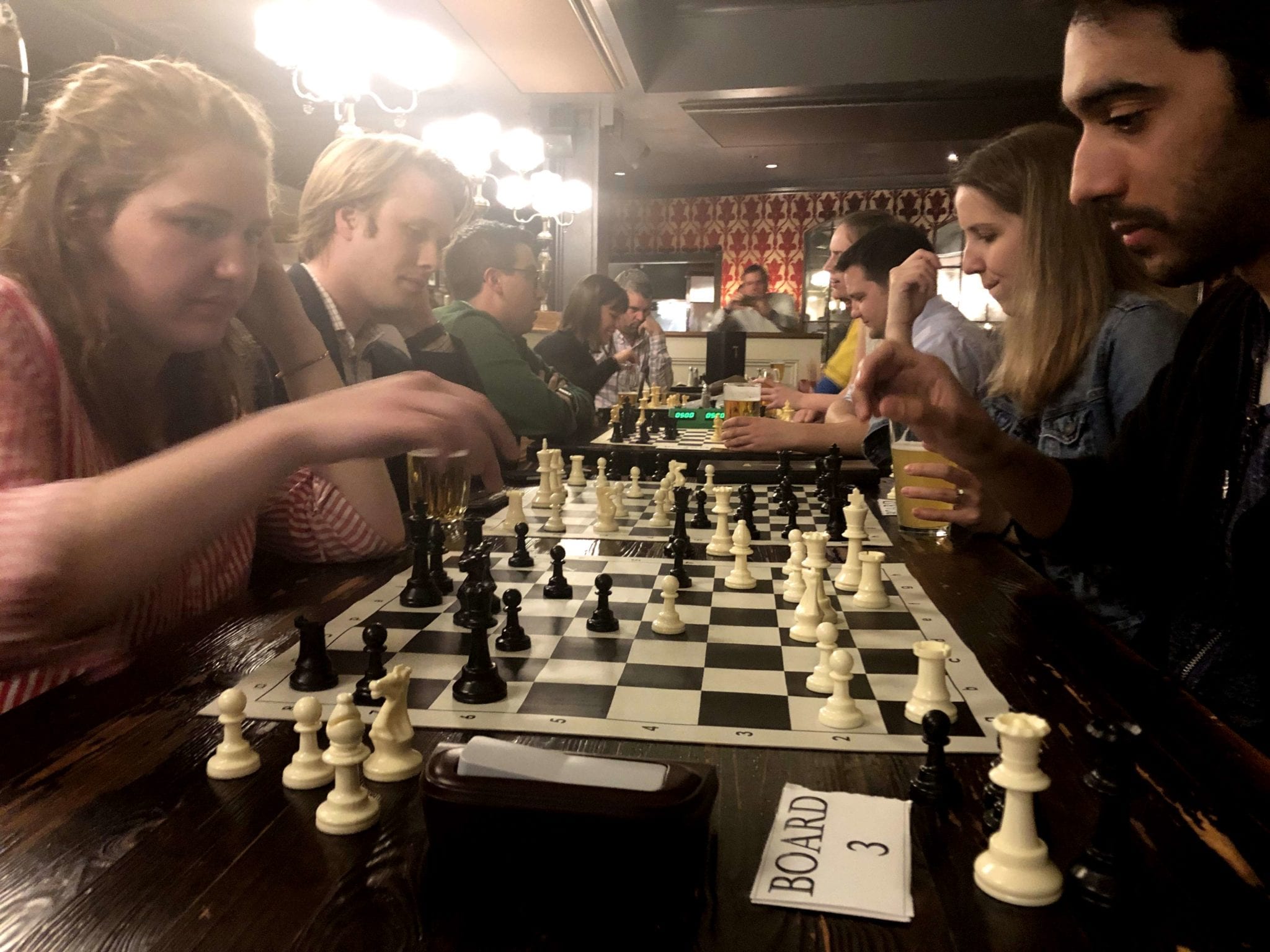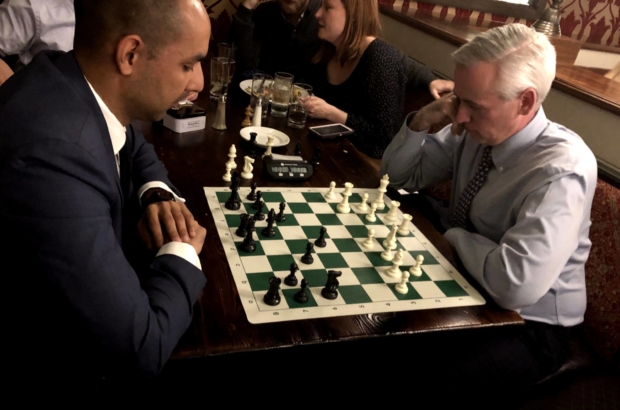
I’M AT CARRIE NATION, a prohibition-era themed Beacon Hill bar just down the street from the Massachusetts State House. On an island of tables floating between a legislative fundraiser in the front room and a bar full of power drinks after work, there are eight chess games underway. The room is noisy with friendly conversation and the beers alongside the boards sit at various stages of empty. Nobody expects the usual anxious quiet of chess tournaments, and nobody wants it.
Hovering over the boards are state legislators, lobbyists, lawyers, journalists, pollsters, pundits, interns, and hangers on. Punctuating the conversation is the muted thud of urgent hands hitting chess clocks. In this feverish brand of chess, each side has just five minutes to complete all of their moves for the game. Run out of time first, and you lose. You can also lose in the usual way, by checkmate. Skill levels vary from brand new to pretty good, but the spirit and joy of chess are high on every board.
By day, the people in this room run things. They run for things. They fight for things. They fight each other for things. But for this moment, few remember who in the room is a Republican and who is a Democrat. The frantic cacophony of partisan warfare that roars through the rest of the week fades to nothing. And there is just the chess. The Beacon Hill Chess Tournament, now in its fifth installment, is underway.
The roots of this growing and still pleasantly motley gathering can be traced to a single game on chess.com between myself and Ed Lyons, a political author and commentator in Boston. It was just for fun. No plans. No strings. We tweeted light-hearted banter about the game, enjoying ourselves for sure, but with no thought anybody would notice or care.
Then something happened. People followed along and cheered on the game, tweeting ideas and thoughts. The outlines of a community sprung from the Massachusetts political woodwork when images of chess positions appeared on Twitter.
Several months later Ed and I gathered a few of the hardiest souls together for the inaugural Beacon Hill Chess Tournament. The first one had eight players taking turns on two boards in a rapid format. It was held one Wednesday evening in the Last Hurrah, a whiskey bar at the Omni Parker House with a deep and distinguished political history. It was pure joy–deep thinking, fast moving, hard-fought games of chess. Between the gambits and the checkmates, friendships came to life.
We just had to do it again. The next time we had 12 players. Then 16, and then 24. Stephanie Murray, a reporter for Politico learned how to play chess just so she could participate, and she was not the only one. Jay Ash, a former state cabinet secretary came to make the ceremonial first move. Others from around the state’s political establishment found out about it on social media, and joined in, some dusting off chess skills they hadn’t practiced since childhood. The crew is diverse, both politically and demographically, with more women and people of color than most chess events draw. This last round, we had state legislators who had to wrap up voting before making it to the tournament.
But it’s still all for fun. There are no rating points to be gained or lost. Few are rated, none are masters, and there’s a pretty good chance none ever will be. The traveling “trophy” is an oversized wooden chess piece we call “The Sheldon King,” named after a former state Supreme Judicial Court judge and chess player. The whole thing is complete with whimsical themes from co-organizer Rachel Dec. (#FyreChesstival anyone?)

English chess Grandmaster Simon Williams put it best when he said, “The beauty of chess is it can be whatever you want it to be. It transcends language, age, race, religion, politics, gender and socioeconomic background. Whatever your circumstances, anyone can enjoy a good fight to the death over the chess board.”
The experience of organizing this tournament has shown me that politics needs chess. Not clever chess metaphors about gambits, endgames, and political pawns. No, we need actual people from across the political spectrum playing chess against one another, in person. We need chess to be a bridge; a reason to meet together and remember we are all human, to communicate in spoken words without gifs, memes, or television ads.
There are precious few places where Democrats and Republicans can meet face to face these days. Most of our dialogue is on social media or on cable news, where we drink a toxic swill of negativity and insults. We hear legends of the political days of yore, when partisans could meet for a drink after battling on the floor of the House by day. But most of us never knew that world and it seems hopelessly locked in the past.
